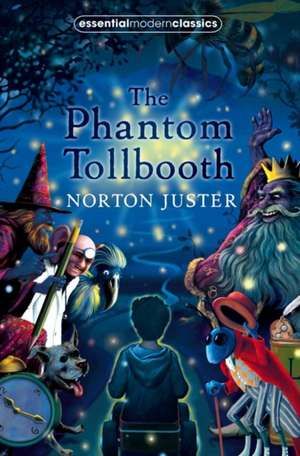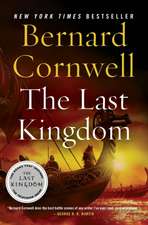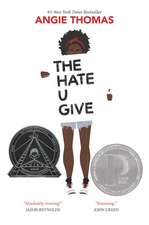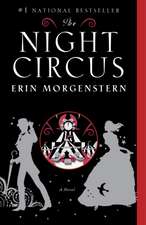The Phantom Tollbooth
Autor Norton Justeren Limba Engleză Paperback – 3 mar 2008
| Toate formatele și edițiile | Preț | Express |
|---|---|---|
| Paperback (2) | 50.87 lei 3-5 săpt. | |
| Random House (NY) – 30 sep 1988 | 50.87 lei 3-5 săpt. | |
| HarperCollins Publishers – 3 mar 2008 | 51.66 lei 3-5 săpt. | +10.46 lei 7-13 zile |
| Hardback (2) | 117.82 lei 3-5 săpt. | |
| Perfection Learning – 30 sep 1988 | 117.82 lei 3-5 săpt. | |
| Bloomsbury Publishing – 30 sep 1988 | 132.12 lei 3-5 săpt. |
Preț: 51.66 lei
Nou
9.88€ • 10.32$ • 8.18£
Carte disponibilă
Livrare economică 15-29 martie
Livrare express 01-07 martie pentru 20.45 lei
Specificații
ISBN-10: 0007263481
Pagini: 272
Ilustrații: Illustrations
Dimensiuni: 129 x 199 x 27 mm
Greutate: 0.25 kg
Ediția:New ed
Editura: HarperCollins Publishers
Locul publicării:United Kingdom
Notă biografică
Norton Juster is an architect and the author of other highly acclaimed children's books, including The Dot and the Line, which was made into an Academy Award-winning film, The Hello, Goodbye Window, illustrated by Chris Raschka, which received the Caldecott Medal, and The Odious Ogre, also illustrated by Jules Feiffer. Mr. Juster lives with his wife in western Massachusetts.
Jules Feiffer is the author and illustrator of two novels for young readers, as well as several acclaimed picture books including Bark, George and Meanwhile.... He has won numerous prizes for his cartoons, plays, and screenplays. Mr. Feiffer lives in New York City.
From the Hardcover edition.
Extras
There was once a boy named Milo who didn’t know what to do with himself — not just sometimes, but always.
When he was in school he longed to be out, and when he was out he longed to be in. On the way he thought about coming home, and coming home he thought about going. Wherever he was he wished he were somewhere else, and when he got there he wondered why he’d bothered. Nothing really interested him — least of all the things that should have.
“It seems to me that almost everything is a waste of time,” he remarked one day as he walked dejectedly home from school. “I can’t see the point in learning to solve useless problems, or subtracting turnips from turnips, or knowing where Ethiopia is or how to spell February.” And, since no one bothered to explain otherwise, he regarded the process of seeking knowledge as the greatest waste of time of all.
As he and his unhappy thoughts hurried along (for while he was never anxious to be where he was going, he liked to get there as quickly as possible) it seemed a great wonder that the world, which was so large, could sometimes feel so small and empty.
“And worst of all,” he continued sadly, “there’s nothing for me to do, nowhere I’d care to go, and hardly anything worth seeing,” He punctuated this last thought with such a deep sigh that a house sparrow singing nearby stopped and rushed home to be with his family.
Without stopping or looking up, Milo dashed past the buildings and busy shops that lined the street and in a few minutes reached home — dashed through the lobby — hopped onto the elevator — two, three, four, five, six, seven, eight, and off again — opened the apartment door — rushed into his room — flopped dejectedly into a chair, and grumbled softly, “Another long afternoon.”
He looked glumly at all the things he owned. The books that were too much trouble to read, the tools he’d never learned to use, the small electric automobile he hadn’t driven in months — or was it years? — and the hundreds of other games and toys, and bats and balls, and bits and pieces scattered around him. And then, to one side of the room, just next to the phonograph, he noticed something he had certainly never seen before.
Who could possibly have left such an enormous package and such a strange one? For, while it was not quite square, it was definitely not round, and for its size it was larger than almost any other big package of smaller dimension that he’d ever seen.
Attached to one side was a bright-blue envelope which said simply: “FOR MILO, WHO HAS PLENTY OF TIME.”
Of course, if you’ve ever gotten a surprise package you can imagine how puzzled and excited Milo was; and if you’ve never gotten one, pay close attention, because someday you might.
“I don’t think it’s my birthday,” he puzzled, “and Christmas must be months away, and I haven’t been outstandingly good, or even good at all.” (He had to admit this even to himself.) “Most probably I won’t like it anyway, but since I don’t know where it came from, I can’t possibly send it back.” He thought about it for quite a while and then opened the envelope, but just to be polite.
“ONE GENUINE TURNPIKE TOLLBOOTH,” it stated — and then it went on:
“EASILY ASSEMBLED AT HOME, AND FOR USE BY THOSE WHO HAVE NEVER TRAVELED IN LANDS BEYOOND.”
“Beyond what?” thought Milo as he continued to read.
“THIS PACKAGE CONTAINS THE FOLLOWING ITEMS:
“One (1) genuine turnpike tollbooth to be erected according to directions.
“Three (3) precautionary signs to be used in a precautionary fashion.
“Assorted coins for use in paying tolls.
“One (1) map, up to date and carefully drawn by master cartographers, depicting natural and man-made features.
“One (1) book of rules and traffic regulations, which may not be bent or broken.”
And in smaller letters at the bottom it concluded:
“RESULTS ARE NOT GUARANTEED, BUT IF NOT PERFECTLY SATISFIED, YOUR WASTED TIME WILL BE REFUNDED.”
Following the instructions, which told him to cut here, lift there, and fold back all around, he soon had the tollbooth unpacked and set up on its stand. He fitted the windows in place and attached the roof, which extended out on both sides, and fastened on the coin box. It was very much like the tollbooths he’d seen many times on family trips, except of course it was much smaller and purple.
“What a strange present,” he thought to himself. “The least they could have done was to send a highway with it, for it’s terribly impractical without one.” But since, at the time, there was nothing else he wanted to play with, he set up the three signs,
SLOW DOWN APPROACHING TOLLBOOTH
PLEASE HAVE YOUR FARE READY
HAVE YOUR DESTINATION IN MIND
And slowly unfolded the map.
As the announcement stated, it was a beautiful map, in many colors, showing principal roads, rivers and seas, towns and cities, mountains and valleys, intersections and detours, and sites of outstanding interest both beautiful and historic.
The only trouble was that Milo had never heard of any of the places it indicated, and even the names sounded most peculiar.
“I don’t think there really is such a country,” he concluded after studying it carefully. “Well, it doesn’t matter anyway.” And he closed his eyes and poked a finger at the map.
“Dictionopolis,” read Milo slowly when he saw what his finger had chosen. “Oh, well, I might as well go there as anywhere.”
He walked across the room and dusted the car off carefully. Then, taking the map and rule book with him, he hopped in and, for lack of anything better to do, drove slowly up to the tollbooth. As he deposited his coin and rolled past he remarked wistfully, “I do hope this is an interesting game, otherwise the afternoon will be so terribly dull.”
Recenzii
--Anna Quindlen, The New York Times
"A classic... Humorous, full of warmth and real invention."
--The New Yorker

















